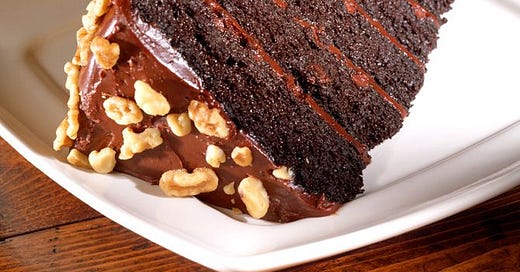The illiterate of the 21st century will not be those who cannot read and write, but those who cannot learn, unlearn, and relearn. - Alvin Toffler
The Claim Jumper, a restaurant I used to go to, was famous for it's chocolate cake. The restaurant's theme was mining (as in for gold) and the chocolate cake was aptly named "The Motherlode." Six layers thick, a single slice stood nine or ten inches high and cost something like 20 bucks in today's dollars. It was a rare experience in that both the anticipation and the enjoyment of a slice from The Motherlode were equally enjoyable and time consuming. One did not rush or finish a slice in a single sitting. As fortune and fate would have it, the Claim Jumper eventually closed and my health was spared.
I often compare really good writing to a slice of The Motherlode. I prefer reading and writing the long form essay - things that are well crafted, dive deep into ideas, and if related to things scientific, are rich in referenced content. Articles that require not just one, but two cups of coffee as I work my way through the places the author wants to guide me. The late Christoper Hitchens stands out as a good example. Virginia Postrel, Camille Paglia, and Rob Henderson are a few more examples that come to mind just now. I don't always agree with them, but they do challenge my thinking and world view.
Alas, this is not the way to get noticed as a writer in the Attention Economy. Quick hits, snarky bits, and biting digs on current events are the assumed way to build an audience. Years ago, on a self-hosted sited from the Golden Age of blogging, a short-lived experiment of mine with this approach resulted in exhaustion and a bad attitude. I could feel depression accumulating like sediment in a water filter. The answer was clear: That style of writing was not for me - neither the writing of it nor the reading of it.
Writing is how I clarify my thinking. It's a never ending, iterative process that challenges me to work hard and be thorough as I vet what I know about the world.
The process that works for me is an adaptation of Gerald Weinberg's fieldstone method for writing. Instead of working to put stones together to form a castle, I work to put together short stretches of walls or sections of a foundation and build to something greater over time. Smaller stand-alone structures that appeal to a wider audience than those of the long-form essay, but not so narrowly focused as to appeal to those drawn to shiny or smelly objects. Over time, through the magic of hyperlinks, I can tie these smaller structures into a bigger idea. If someone is so inclined, they can thread their way through the various layers and, if I've done my work, enjoy an extended walkabout and discover a few new things.
Often, I build a small wall that I'm particularly proud of. Then I build another one that needs some of the stones from the first wall. Then the first wall looks rather ridiculous and I knock it over. I change my mind about the ideas used to build the first wall - I unlearn the stones and either cast them away or recast them into something I've learned that is stronger and more resilient. And sometimes, the storms of life blow through my little walls and I start from scratch.
Looking back on many years of writing, I've not known a blank page I couldn't fill with ideas or the self-imposed curse of writer's block. If the ideas for writing don't come quickly to mind, the solution is a mental walkabout through my extensive collection of ideas and kick a few loose stones around just to see how far they go and what other stones they land next to.




